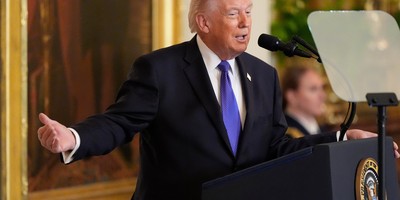In the current debate over the lame duck deal, the focus seems to be solely on the issue of taxes. Raising rates or closing loopholes: which will it be? After all it’s essential that the federal government increase its revenues, right? Everyone knows the government has run out of money, and talk of another debt limit debacle is already surfacing.
Is the cause of the deficit declining federal revenues? Perhaps it's those pesky billionaires moving jobs and profits overseas? Or, there's always some way to blame oil companies or George W. Bush.
The reality is far less flattering for liberals like President Obama. In the last decade federal revenues from capital gains taxes have steadily increased thanks to lower rates. Because investors have a greater incentive to realize gains when faced with lower tax penalties, capital gains revenues jumped from $56.3 billion in 2003 to $110 billion in 2006. Those Bush tax cuts of 2001 and 2003 - as usual with tax cuts - resulted in INCREASED tax revenues.
The problem is not that Americans aren’t paying their “fair share” to the government. Of the $2.3 trillion in revenue collected in 2011, approximately 46% came from individual income taxes. The uncomfortable truth for liberals: the federal government has a compulsive spending disorder. While revenues have remained steady, government spending has ballooned. Federal Government spending accounted for over 24% of the United States economy in 2011. To put that into perspective, in 2000 that percentage was only 18. Since 2000, the federal budget has grown by more than 53%, even after factoring for inflation. Since 2007 alone, federal baseline spending has increased by $1 trillion.
Now Uncle Sam must do what the rest of us do in lean economic times: cut back on spending. And we’re not talking about just Big Bird, although the government spent $10 million for a Pakistani “Sesame Street” according to Senator Tom Coburn’s Wastebook 2011 oversight report.
Recommended
In last year’s deficit deal, Congress agreed to $109 billion in automatic cuts in January 2013. Now the President and the Leadership in both parties are backpeddling even from these modest spending cuts. Remember, we had a budget deficit of over $1 trillion this past fiscal year. Congress should keep its word to the American people and cut the $109 billion as promised. If the across-the-board cuts that affect defense are deemed to draconian for America’s security, equivalent spending cuts from elsewhere in the federal budget should be made.
Government bureaucracy is notorious for inefficiency. For anyone in doubt, last year the U.S. Office of Personnel Management continued to send $120 million in benefits checks to deceased federal employees. And of course, as everyone knows from the headlines earlier this year, there are the government organizations who organize lavish retreats and conferences on the taxpayer dime.
Even the vital defense department is not immune from wasteful spending. The Commission on Wartime Contracting informed Congress that wasteful and fraudulent contracting for the Iraq and Afghanistan wars alone accounted for anywhere from $31 billion to $60 billion.
While it was deeply disappointing to see Speaker Boehner and even Paul Ryan sign on for new tax increases and while we will aggressively oppose their efforts on this front, AFP does respect the Ryan Budget that the Speaker helped shepherd through the House for the last two years. Their budget does what President Obama and his liberal friends refuse to do. It reforms entitlement programs -- in effect saving Medicare and Medicaid by making them sustainable, more efficient and by giving actual choices to individual Americans.
Meanwhile, President Obama continues his venomous class warfare while demagoguing these honest GOP efforts to rein in entitlements.
President Obama addresses the spending problem in rhetoric only, and dismisses any substantive action on the problem. His primary focus is on an imagined mandate to raise taxes. On the contrary, nothing changed with the 2012 election; a few seats here and there, but there was no shift in the balance of power. In 2010, Americans overwhelmingly voted conservatives into a House majority, which remains in effect today. Now is the time for those members to follow through on their promise to the American people, and cut wasteful government spending.

























Join the conversation as a VIP Member